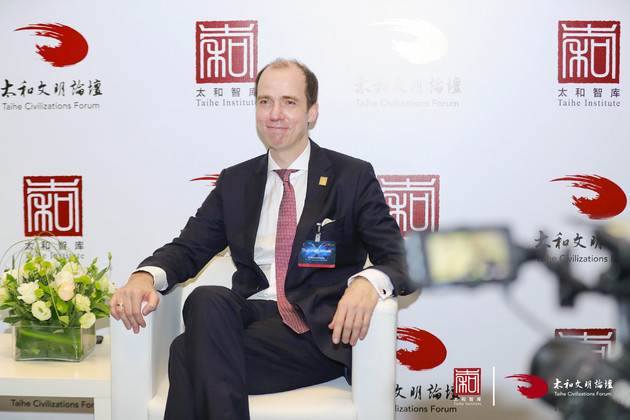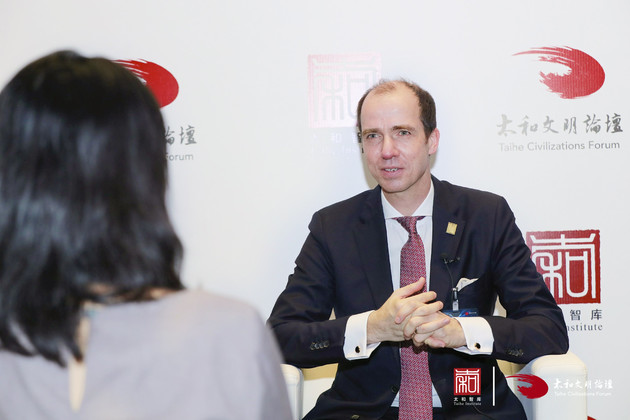
Thorsten Jelinek (Photo provided by Taihe Institute to NBD)
Sept. 7 (NBD) -- Artificial intelligence (AI) is undoubtedly a kind of advanced technology that is claimed to be capable of transforming the world in the future.
"AI has received much attention in terms of publications, patents, funding from the public or the private side. And then there sees AI national strategy by governments around the world," Thorsten Jelinek, director of Taihe Institute Europe Center and also an AI expert, said to National Business Daily (NBD) during the third Taihe Civilizations Forum.
With the theme of "Science Culture · Future Ethics · Common Values", the Forum is initiated by Taihe Institute in strategic partnership with NBD Think Tank and slated for September 6-8 in China's capital city Beijing and brings together approximately 500 leading experts from business, governmental, international organizations, and academic sectors this year.
Jelinek is a keynote speaker at the Advanced Technology Session of the annual gathering.
Hit facial recognition stands for early stage of AI development
NBD noticed that AI has become the main business focus of the 25 top Chinese startups, among which 11 have put AI at the core of their business, a report by LinkedIn shows.
In the domain of AI, facial recognition is a frequently discussed topic. However, Jelinek held that facial recognition merely stands for the early stage of AI development.
Algorithm behind face recognition is machine learning and this is the first step of AI, he said. "The next big movement will be the interaction between AI and the physical world, such as robots control system which needs reinforcement learning via trial and error. After that, the next step will be a completely unsupervised learning, more close to how infants and children learn," noted Jelinek to NBD.

Thorsten Jelinek in interview with NBD (Photo provided by Taihe Institute to NBD)
A face-swapping app dubbed Zao recently took the Internet by storm, and rocketed to the top of the free app download list before being removed from both Android and Apple's app stores. Along with the great popularity came growing concerns about privacy.
"In a way it's kind of entertainment," commented Jelinek on the popularity of the face-swapping app. "The new technology is always picked up very quickly in China compared to Europe. I think it's the enjoyment of a new technology that makes it so popular, especially if it imitates in a way a human task very efficiently like facial recognition and impersonation."
But there sees more tricky risks than user privacy. "As to the first risk, maybe don't think about the privacy concern. Think about security first. Security is already a big topic in today's digitalization. There are lots of attacks involving malicious use and now with AI mind hackers can automate it," said Jelinek to NBD. "I think there still are big opportunities (in AI development) and hopefully those will prevail over the risks that are staggering."
AI is not a question of optimism or pessimism
Because of intelligent automation, a combination of AI and automation, there witnesses a changing landscape of risks especially those with transformative force to influence the economy, governments and politics, international relations, and the society, like mass unemployment or displacement of labor, according to Jelinek.
Tech tycoons Jack Ma, founder of Alibaba, and Elon Musk, founder of Tesla, had a debate and threw opposing views on AI at the World Artificial Intelligence Conference at the end of August.
Ma said AI will free human from overloads but humans will never be controlled by machines, while Musk warned that humans will be surpassed by computers in every single way soon and in the future, what humans should do is writng AI progrom while AI would do the rest.
"There are some very influential people whom you can always divide by two views towards AI: skeptical and positive. But I think AI is not a question of optimism or pessimism. You need to be realistic about what potentially can happen," remarked Jelinek to NBD. "If you think of past revolutions, human only competed with the human capacity in the physical world while now human is competing with the intellectual world. For now, we don't see where it will stop with AI at the endpoint."
Besides AI, Jelinek emphasizes the emerging power of other advanced technologies like 5G, smart automation, biosynthesis and quantum computing in tackling urgent world puzzles like climate change and inequality.
Email: lansuying@nbd.com.cn


 川公网安备 51019002001991号
川公网安备 51019002001991号





